

Discover Living Labs Insights for a concise overview of innovative solutions, projects, and technical deliverables. Stay updated with regular insights featuring descriptive articles and visuals directly from the Living Labs. Explore ongoing advancements and progress within our Living Labs projects.
Explore DISCO Living Lab Innovations for in-depth insights into groundbreaking projects and solutions. Delve into a comprehensive overview of ongoing initiatives within our Living Labs, highlighting their impactful contributions to innovation and problem-solving. Get updates and insights directly from our DISCO Living Labs, exploring the latest developments, progress reports, and innovative solutions as we share regular updates on ongoing initiatives and projects within our Living Labs network.
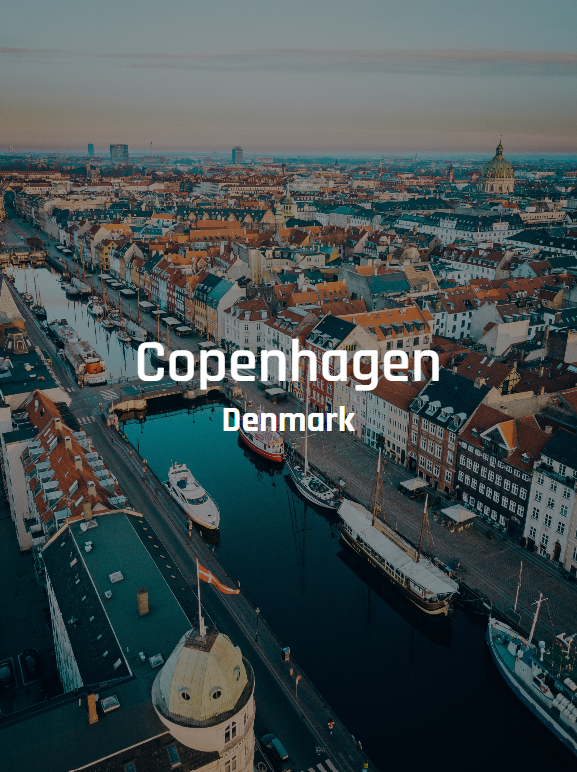 |
The City of Copenhagen is one of the selected EU Mission 100 climate-neutral and smart cities by 2030. To reach its climate objectives and deploy zero-emission logistic solutions, Copenhagen is taking an integrated approach through DISCO to ensure that the entire functional urban area benefits from the transition. The City recognises that its policies will affect local stakeholders, and will therefore work closely with industry sectors, citizens, and public authorities to ensure desirable outcomes for all. |
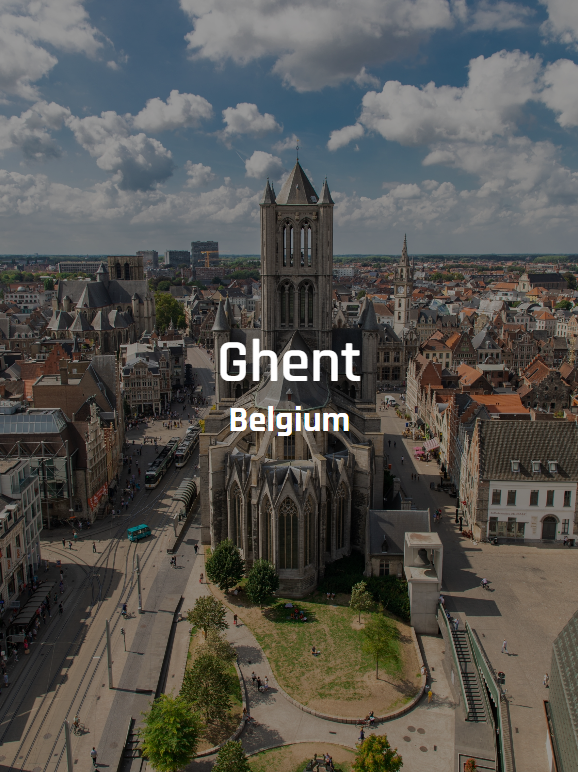 |
The City of Ghent is a medium-sized medieval European city surrounded by an inner ring and outer ring (R4). In the historic centre, Ghent has a pedestrian area of 2 km². The municipality has incorporated many efforts to green the city including a modal shift as a cornerstone in Ghent’s SUMP 2014 and in 2019, a low-emission zone and a “Vision for the Use of Water in the City” which focuses on developing the use of waterways for freight transport. Ghent also aims to be climate neutral by 2050. |
|---|
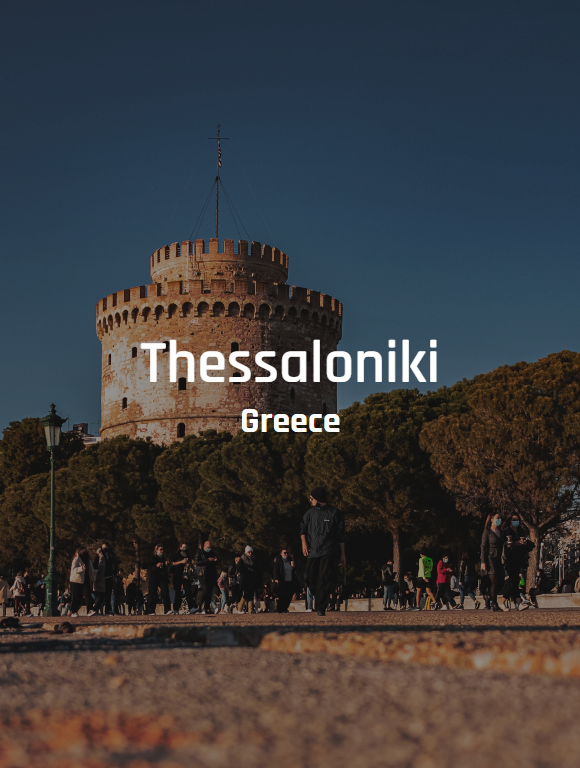 |
The City of Thessaloniki is one of the 100 EU Mission climate-neutral and smart cities by 2030. The City’s challenge is to become a zero-emission city by 2030, achieve optimised use of public space and overall enhanced citizens’ quality of life. Currently, in the historical centre, the main demand generators for last-mile transport are the commercial establishments and, more specifically, from fashion and HORECA. |
|---|
The City of Helsinki is one of the 100 EU Mission 2030 climate-neutral and smart cities. Helsinki logistics operations are currently primarily led by private companies, but the city has an ambition to support the logistics field towards a new sustainable operational model in line with the action plan for city logistics, updated in 2020. In Helsinki, delivery trucks 22-26% of traffic emissions in the city. The overall share of vans used for last-mile logistics is unknown, but most vans are used for other purposes. |
|---|
The Zaragoza Living Lab will enhance its last mile delivery thanks to an adapted Control Tower of multi stakeholder delivery management. It will boost local commerce via the integration and enhancement of the Citizen Card and the Volveremos groupon program, which provide an understanding of the transport and social behaviours. The Data Space will be utilised as a solid platform to create added value to the city by developing a vision and a work line withinthe City’s #DataLab team’s adapted to the guidelines of the Data Act initiative. |
|---|
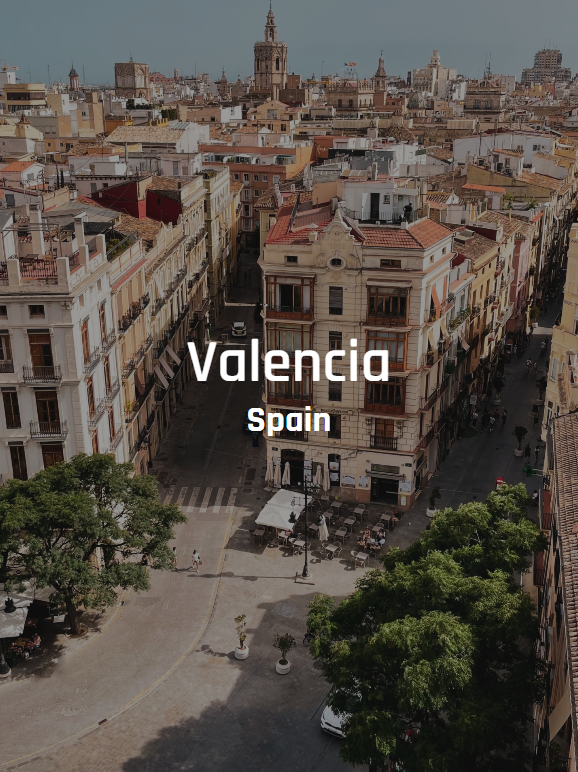 |
The Valencia Living Lab will implement a Supply Chain Hub (SCH), a flexible logistics facility in which several supply chains that serve the B2B/B2C last mile will be managed. In DISCO, AI will be used for the consolidation and regrouping of loads (multisector and multiproduct), unification of the distribution in a single fleet of zero-emission vehicles (100% electric designed to carry out an operationally efficient last mile distribution). |
|---|
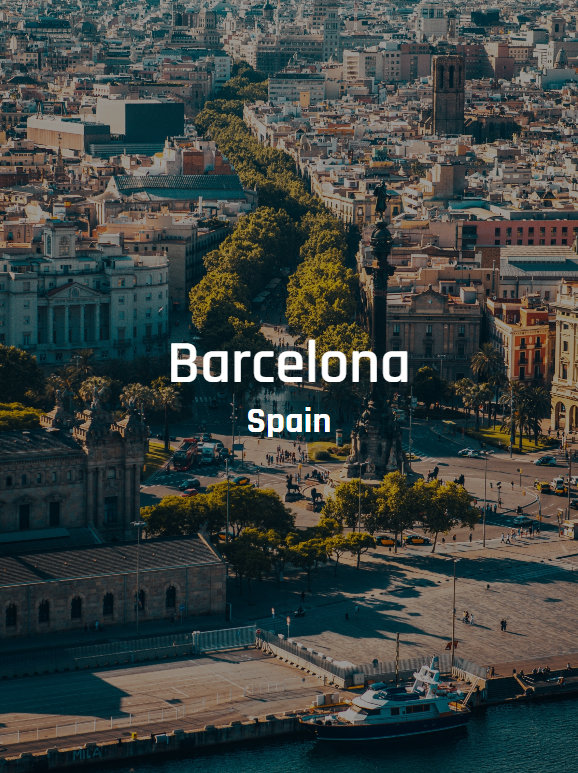 |
Barcelona, Valencia, and Zaragoza have established a well-connected cluster of cities belonging to the same country (Spain) to empower the positive effects of implementation, uptake, and replication potentials of sets of complementary measures on a larger scale and in various local conditions. All the three cities have ambitious plans and sustainable goals and have therefore all been selected as part of the “100 EU Mission climate-neutral and smart cities by 2030”. |
|---|
The City of Padua is a major centre for services, tourism, and culture, and is surrounded by a large, dynamic area that has experienced significant growth in recent years and, as such, is a significant generator of travel.The city is well connected with neighbouring cities in the Veneto Region, and with long-distance transport networks. It is one of the selected 100 EU “Mission climate-neutral and smart cities by 2030” |
|---|
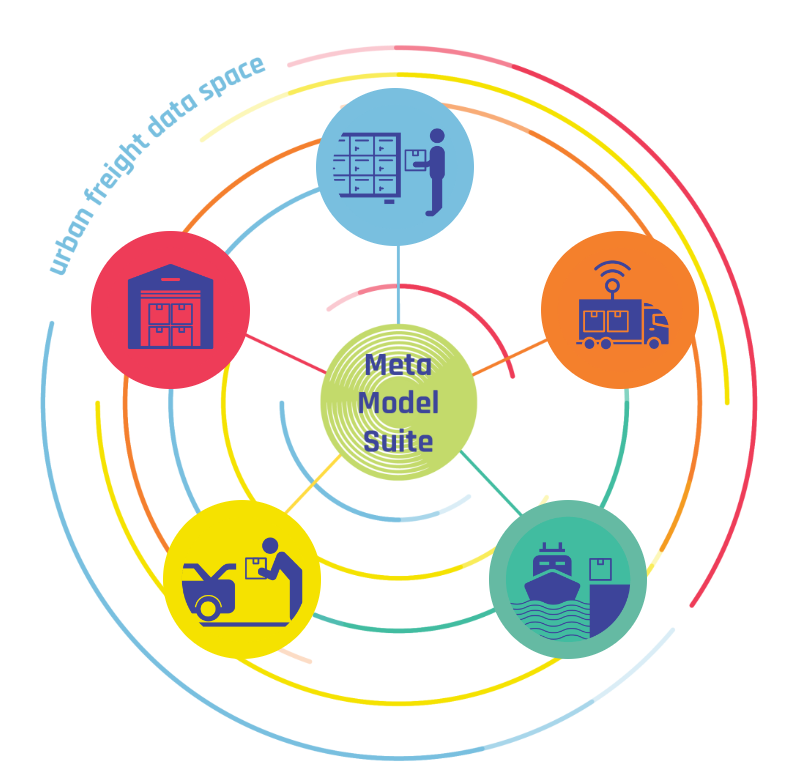 |
DISCO stands for ‘Data-driven, Integrated, Syncromodal, Collaborative and Optimised urban freight meta-model for a new generation of urban logistics and planning with data sharing at European Living Labs’. Our aim is simple: to support the EU mission cities in achieving their climate goals by 2030, letting our living spaces breathe new life away from air pollutants.How? We will drive EU Cities towards a Physical Internet (PI) approach that aims to overcome possible trade-offs between the accessibility of goods and services, quality of life and environmental aspects necessitating fewer kms travelled to deliver the same amount of goods. |
|---|
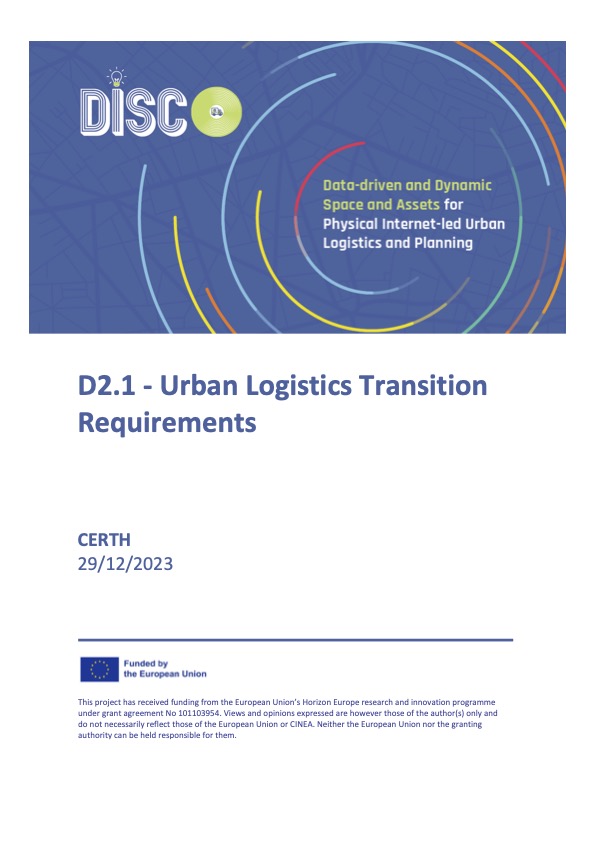 |
|
|---|
 |
Link to the pdf |
|---|
 |
|
|---|
 |
The Urban Freight Data Space (UFDS) aims to revolutionise urban logistics by enabling data sharing and collaboration among stakeholders. This project focuses on developing a secure and standardized data-sharing platform that supports data sovereignty. By integrating diverse data sources, UFDS will empower stakeholders to make informed decisions, optimize operations, and contribute to more sustainable urban logistics solutions. This DISCO deliverable outlines the architecture and development plan for UFDS, highlighting its potential to transform the industry.Link to the pdf |
|---|
 |
|
|---|
 |
The DISCO Meta Model Suite (MMS) is a key component of the DISCO project aimed at improving urban logistics. It is designed to address the challenges posed by increasing urbanization, e-commerce, and environmental concerns. The MMS promotes collaboration, interoperability, and resource sharing, aligning with the principles of the Physical Internet. By leveraging advanced technologies and data-driven strategies, the MMS aims to create more efficient, sustainable, and responsive urban logistics systems.Link to the pdf |
|---|
 |
This Data Management Plan is the second version of the document and describes the data management processes for data generated within the DISCO project, including the methodologies and standards to be followed to ensure protection, security, and confidentiality. It details the updated list of datasets generated and guidelines for data management, aligning with FAIR principles. The plan intends to publish non-confidential results under Open Access and will be updated twice more during the project.Link to the pdf |
|---|
 |
This Data Management Plan is the second version of the document and describes the data management processes for data generated within the DISCO project, including the methodologies and standards to be followed to ensure protection, security, and confidentiality. It details the updated list of datasets generated and guidelines for data management, aligning with FAIR principles. The plan intends to publish non-confidential results under Open Access and will be updated twice more during the project.Link to the pdf |
|---|
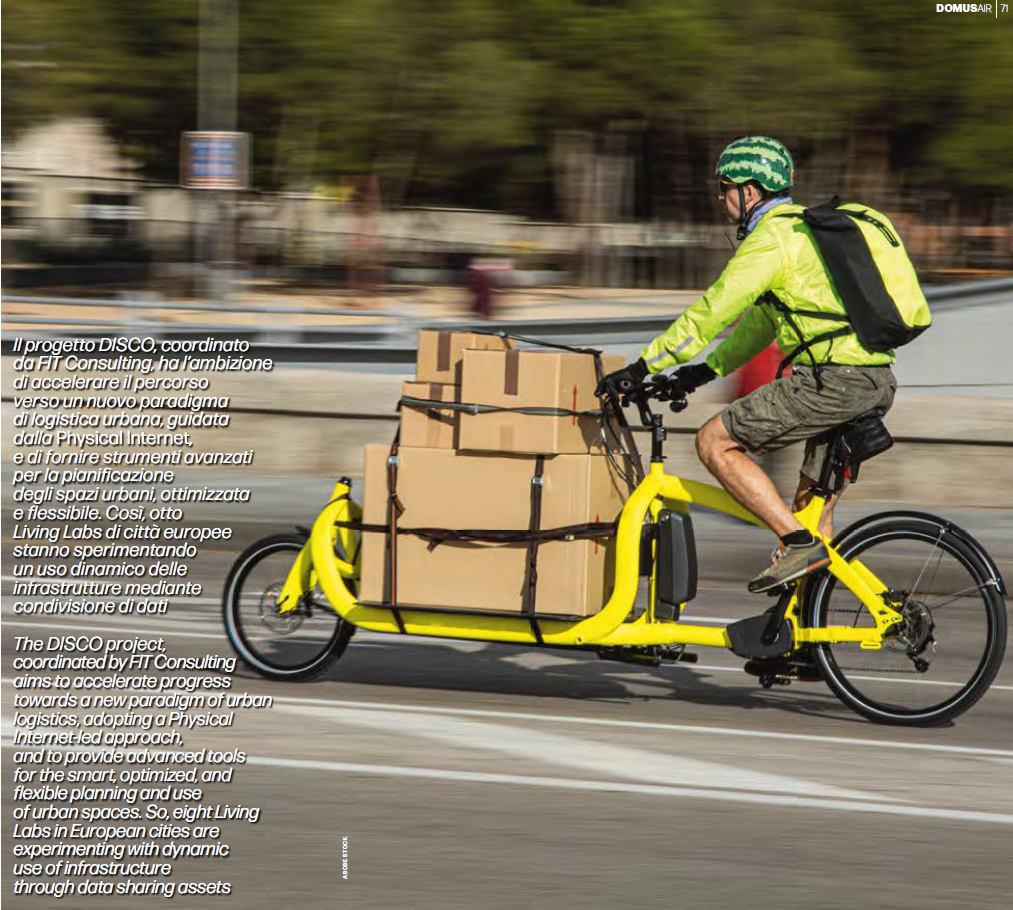 |
This article contribution to "Domus" magazine highlights the DISCO project as an innovative initiative advancing urban logistics through digitalization, hyperconnectivity, and collaboration. It emphasizes the concept of data spaces—secure environments for sharing logistical data—and the Physical Internet paradigm to improve the efficiency and sustainability of freight transport. The article also discusses pilot implementations in DISCO's eight cities, demonstrating shared infrastructure, digital twins, and sustainable last-mile delivery. By integrating advanced tools and fostering public-private collaboration, DISCO aims to guide cities toward zero-emission urban systems and smarter logistics management, offering practical solutions for planners and stakeholders.Link to the Magazine |
|---|
 |
During the DISCO Project meeting held in Cologne in October 2024, Anne Goodchild presented the findings from the Urban Freight Lab's DISCOCURB initiative. This project aimed to analyze commercial vehicle parking behaviors and the effectiveness of a new parking application, Open Park. The study involved a randomized experiment comparing delivery performance metrics between drivers using the app and those without it. Key results indicated that current curbspace management practices in Seattle are underutilized, with a significant percentage of commercial vehicles parking without permits. The presentation highlighted the need for improved enforcement and technology adoption to enhance curb management efficiency and compliance among commercial vehicle operators. Overall, the insights from ICBT experts emphasized the importance of data-driven approaches in urban freight logistics to foster better outcomes for both city infrastructure and service providers.Link to the Pdf |
|---|
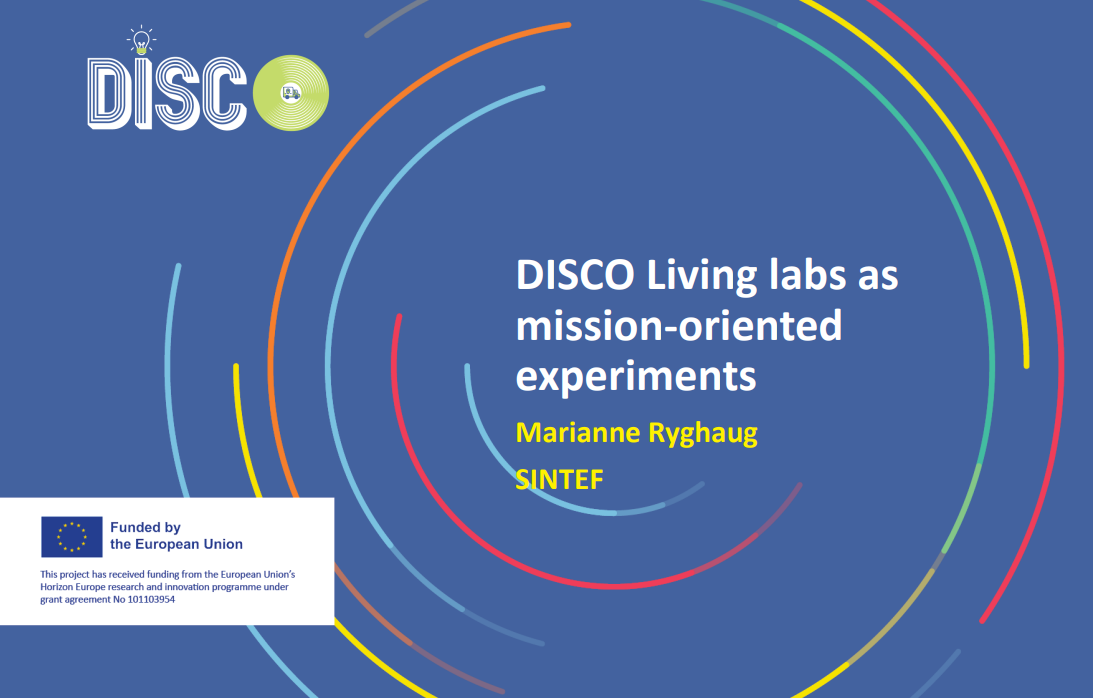 |
This presentation, delivered by Marianne Ryghaug from SINTEF, was part of the DISCO Project meeting held in Cologne in October 2024, focusing on " mission-oriented experiments " in urban logistics transformation as part of the EU Horizon Mission for Climate-Neutral and Smart Cities by 2030. Marianne Ryghaug emphasized the critical role of epistemic inclusion, which involves integrating technical, social, and local knowledge through open dialogues that address controversies and failures. The presentation outlined ten key recommendations aimed at fostering effective climate innovation, including normalizing the sharing of failures, recognizing non-linear innovation processes, and promoting citizen participation beyond mere acceptance to enable co-creation. Ryghaug highlighted that epistemic inclusion is essential for adapting governance structures and ensuring diverse knowledge integration, ultimately enhancing the efficacy of urban climate initiatives. The conclusion underscored that addressing climate change requires inclusive approaches and adaptive governance mechanisms to navigate complex societal challenges effectively.Link to the pdf |
|---|
 |
This presentation, delivered by Andreas Nettsträter, was part of the DISCO Project meeting held in Cologne in October 2024, focusing on the exchange of insights from ICBT experts. It emphasized the significance of open source in the logistics industry, highlighting how collaborative development can foster innovation in basic and commodity services that are typically non-market-differentiating. The Open Logistics Foundation serves as a neutral platform for creating open source solutions, enabling efficient data exchange and improving logistics processes such as digital air cargo and customs operations. The initiative aims to engage a diverse community of stakeholders, including logistics service providers and IT solution companies, to collectively enhance the industry's capabilities while ensuring that all contributions remain accessible and free of commercial interests.Link to the pdf |
|---|
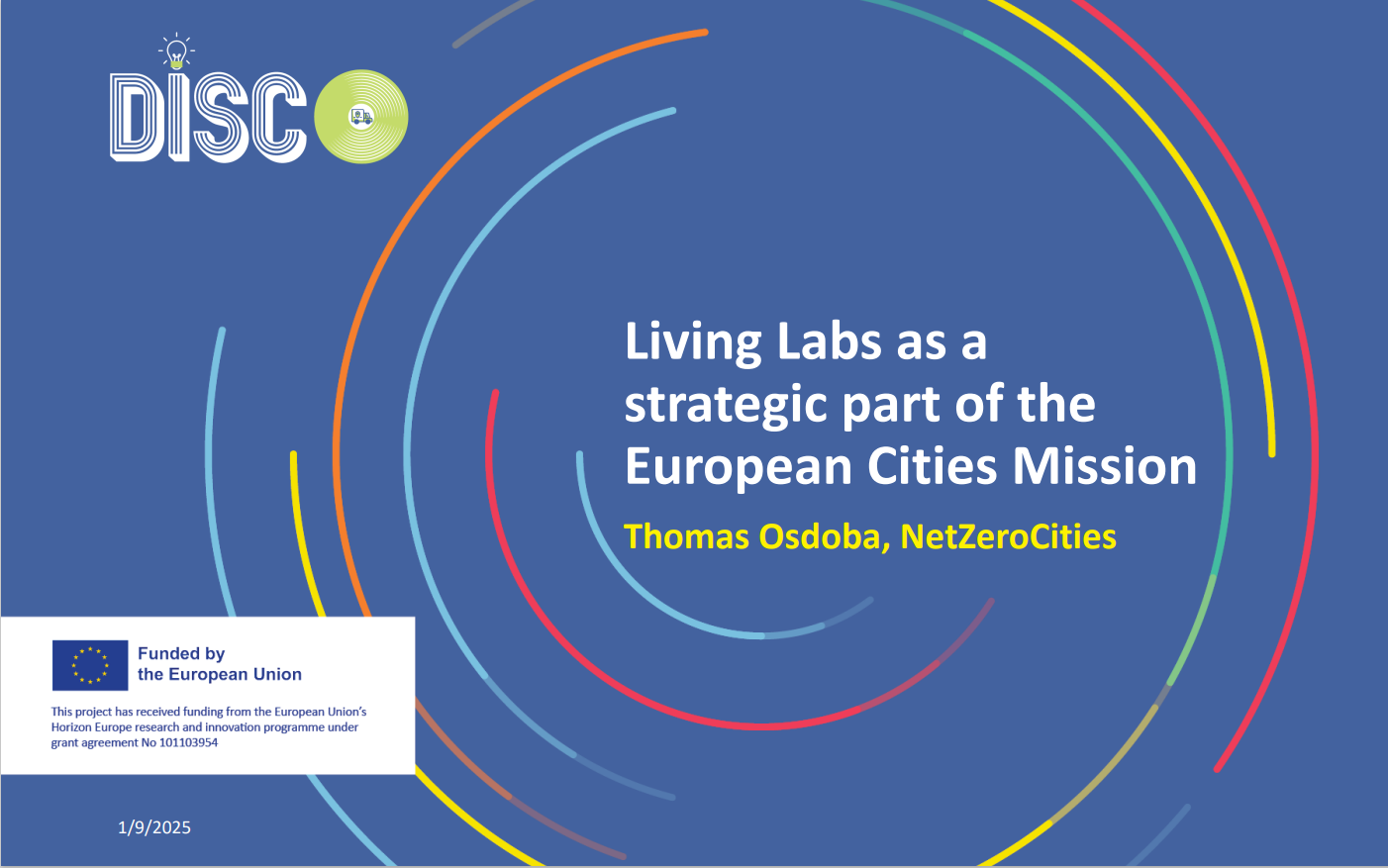 |
This presentation, delivered by Thomas Osdoba from NetZeroCities during the ICBT experts exchange in Cologne (October 2024), explored the role of Living Labs in catalyzing climate neutrality within the European Cities Mission.. Thomas Osdoba highlighted NetZeroCities’ comprehensive support, including the Climate Transition Map, NZC portal, pilot programs, and twinning initiatives. The session emphasized systemic innovation, aligning governance, policy, and business strategies, and fostering partnerships among cities, businesses, and communities. By innovating at local levels, replicable solutions were showcased, alongside insights into overcoming systemic barriers, scaling impact, and leveraging 20 years of shared practices to achieve sustainable urban transformation..Link to the pdf |
|---|
 |
The document describes a Microhub concept designed to make urban logistics more sustainable and economically viable. Microhubs are small logistics centers located close to delivery areas, facilitating last-mile distribution by consolidating shipments and using lighter vehicles like cargo bikes and delivery robots. The concept aims to reduce emissions, air pollution, and congestion, while also improving business efficiency. Key aspects include a market-based business model, strategic location of hubs, efficient handling of small to medium-sized non-time-critical shipments, and the integration of services like parcel lockers.Link to the pdf |
|---|
|
|
DISCOLLECT has developed a Smart Data Platform (SDP) based on the Dagster database software to help cities onboard their data to the UFDS. The SDP consists of a data space connector, a database, and additional components for data scraping and conversion. Cities can use this framework to offer their data to the data space by connecting their open data portals to the SDP. As an example, Ghent has used this framework to offer parking data to the UFDS. The SDP scrapes parking data from Ghent's open data portal, converts it to the right standard, and connects it to the UFDS. Inlecom has then developed a 2D visualiser app that visualizes the parking data by pulling it from the SDP through a UFDS connector and a middleware component.
|
|---|
|
|
Whether data is required or data is to be shared with others: Users of a data space must be competent and understand the business, organizational and basic technical aspects of data spaces. The Data Space User Group is designed for professionals who want to understand, explore, and benefit from data spaces – without needing deep technical expertise.The User Group offers: engagement – regular opportunities to engage with peers, learn about solutions, and share data space needs –; business insight – all relevant data news and information –; and holistic knowledge and solutions arena – the most complete library of papers, guides, tools, and event recordings on data spaces as well as comprehensive access to all crucial data space solutions and services.Click here to get more information or to even start the certification process. |
|---|
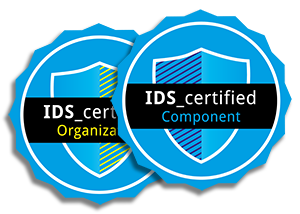 |
The foundation of data spaces is trust, which is established through a rigorous, transparent certification process. The most important component of a data space is the Data Space Connector. To make sure that each connector behaves as it should, it is certified against specific security standards and so is any data space participant. On this basis of trust the participants can start their actual sharing of data.For this International Data Spaces (IDS) Certification of data space components – and even of data space participants –, a certification scheme is applied that defines the rules, and standards of the certification process. The IDS certification scheme follows best practices from internationally accredited certification concepts.Click here to get more information or to even start the certification process. |
|---|
| |
Data spaces offer cities an excellent way to connect with logistics players and integrate valuable city data directly into logistics operations. However, making city data available on a data space can come with some challenges. From valuable logistics data being hidden in internal databases or unpublished archives, to the need for data conversion to international standards, these obstacles can make data sharing difficult. The Smart Data Platform provides a solution, offering a set of tools that help data engineers overcome these hurdles and connect city data sets to the data space.In the Meta Model Suite, users are guided through the entire process of deploying the platform, from importing and transforming unstructured data to automating data collection and publishing it to the data space. With the Smart Data Platform and embedded Data Space Connector, data isn't just exchanged—it's enriched, standardized, and shared as a valuable asset that can drive smarter business applications. |
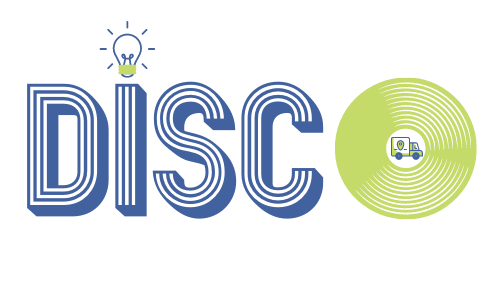 |
Transforming urban logistics requires innovative solutions and in this article we will feature three DISCO innovations that were developed and implemented within our Living Labs; Urban Access Control (UACs), Urban Freight Data Space (UDFS), and WareM&O.The integration of Urban Access Control (UAC) into transport systems has made route navigation smarter and more sustainable. In Ghent, UAC has been successfully implemented within the Dropon Transport Management System (TMS), offering real-time alternative routes to optimize logistics operations and reduce congestion.The Urban Freight Data Space (UFDS) facilitates secure, standardized data sharing among public and private stakeholders, enhancing last-mile deliveries. This platform is already helping cities improve urban logistics by enabling better collaboration and efficiency across various sectors.Additionally, WareM&O is a digital marketplace that connects warehouse owners with tenants, simplifying the process of leasing available space. This platform has been used in the DISCOESTATE pilot project in Thessaloniki, where underused buildings at TIF-HELEXPO were transformed into logistics hubs, improving freight efficiency and helping ACS Courier reduce congestion in the city.Together, these innovations are creating a more efficient, sustainable, and connected urban freight system, transforming logistics in cities worldwide.For more information, check the folder below for brief presentations on each innovation. |
|
|
Data spaces are a great way for cities to connect to logistics players in their cities, and integrate valuable city data directly into the logistics ecosystem. However, making city data available on the data space can come with some technical challenges, both in transforming the data and connecting to the data space. The Smart Data Platform reduces these obstacles to offering data on the data space by providing city data engineers with the tools they need to prepare their data for data space sharing and connect it to the data space. To achieve this, The Smart Data Platform makes use of a pre-existing data transformation (ETL) tool, packaged with a data space connector, which it connects through an overarching UI. This provides cities with all the capabilities of an ETL tool, while reducing the barrier to connecting to the data space. The below document serves as a setup guide for the Smart Data Platform and attached urban Freight data space connector. The setup guide follows the case study of the Ghent Living lab where data was gathered from the Gent Open Data Platform to the Smart Data Platform, and made available to the Disco network via the embedded Sovity dataspace connector (and UI). |
|---|
|
|
Data-level interoperability plays a vital role in a data space, and leveraging standard data models significantly simplifies this process. As a first proof-of-concept, this document shows how the DISCO project incorporates the APDS and DATEX II standards.APDS (Alliance for Parking Data Standards) is an international standard designed to establish a common language for sharing parking data. It aims to promote interoperability between parking systems and services, enabling seamless data exchange across various regions and platforms. DATEX II, on the other hand, is Europe's most widely adopted standard for road situations and traffic regulations. It provides a structured framework for sharing information related to traffic management, road conditions, and regulations, ensuring consistency and compatibility across European transportation systems.This document outlines mapping data from its sources to these two standards. It provides an overview of the APDS and DATEX II standards, detailing their structure and practical applications. Furthermore, it includes specific data mapping examples from the city of Ghent, demonstrating how real-world data can be transformed to comply with these standards. For an in-depth explanation of the ETL (Extract, Transform, Load) technical implementation, including insights into the code and workflows used for this mapping within the framework of the Smart Data Platform, please refer to the DISCOLLECTION Design and Architecture Documentation |
|---|
 |
In Forum Virium Helsinki’s Future blog, our Smart City experts take a peek into the future of their fields, reflect on the change trends in Helsinki and present their vision of how science, technology and experience can best be used for the sustainable development of the city.Check it out here |
|---|
 |
Our latest best practice publication showcases pioneering measures implemented in the Helsinki Living Lab to make urban logistics more efficient and sustainable. The publication not only outlines the goals, implementation process, and key findings, but also offers practical insights and contacts for cities and organisations eager to take action.The report highlights four distinct approaches to monitoring and managing loading zones:
Together, these measures demonstrate how digital tools and innovative technologies can help cities reduce congestion, optimise urban space, and improve the coexistence of freight operations with other urban activities.This publication serves as a valuable resource for municipalities, planners, and logistics stakeholders seeking tested solutions to common challenges in urban freight and loading zone management. |
|---|